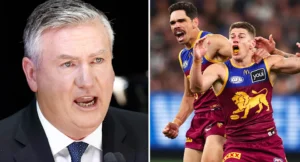 In a bold claim stirring controversy across the AFL community, former Collingwood president and media personality Eddie McGuire has said that a Lions star should have been fined $50,000 for what he described as unsavoury behaviour on the field. While the exact details of the incident have not been confirmed in public records, McGuire’s remarks have reignited debates over player discipline, club responsibility, and the AFL’s consistency in enforcing its conduct rules.
In a bold claim stirring controversy across the AFL community, former Collingwood president and media personality Eddie McGuire has said that a Lions star should have been fined $50,000 for what he described as unsavoury behaviour on the field. While the exact details of the incident have not been confirmed in public records, McGuire’s remarks have reignited debates over player discipline, club responsibility, and the AFL’s consistency in enforcing its conduct rules.
What McGuire Caused Uproar Over
Behaviour in question: McGuire did not publicly name the player but alluded to actions that broke the unwritten code of sportsmanship—taunting, provocation, possibly physical intimidation or verbal abuse. The lack of clarity has led to speculation from fans and pundits about which Lions player and which match.
“Should have been $50,000 fine”: This figure is significantly higher than many recent fines levied by the AFL, suggesting McGuire believes the conduct was grievous enough to merit a punishment that not only penalises but sends a message.
McGuire’s History of Criticism and Standards
Eddie McGuire has long been vocal about what he sees as a decline in player conduct in Australian Rules Football. He has previously:
Called for the introduction of a taunting rule to prevent players from engaging in behaviour that demeans, intimidates or insults opponents.
Criticised instances of “niggling” and tactics aimed at provoking star players, calling certain behaviours “disgraceful” and not fitting for the image of the game.
Questioned whether penalties and suspensions in past incidents have been sufficient or consistent.
Given that backdrop, the $50,000 claim appears aligned with his push for more severe, more visible sanctions for bad behaviour.
Comparisons with Past Penalties
To assess McGuire’s suggestion, it’s instructive to look at what the AFL has done in comparable situations:
Incident Player / Coach Offence / Behaviour Penalty
Ken Hinkley Verbal barrage at opponent (Jack Ginnivan) Harassing / unsportsmanlike comments $20,000 fine
Nine
Taunting / “niggling” vs. Nick Daicos Multiple players involved Provocation, mockery, physical niggling Smaller fines; calls for rule changes rather than huge monetary penalties
Verbal provocation / melees Various Instigating fight, conduct towards opposition Fines in the tens of thousands, but rarely reaching $50,000 unless involving coaches or broader misconduct
From this, McGuire’s proposed $50,000 fine is out of the ordinary but not inconceivable—especially if the conduct was severe, repeated, or involved aggravating factors (e.g. racial slurs, targeted harassment, dangerous physical actions, etc.).
Implications if McGuire’s Call is Taken Seriously
If the AFL or relevant governing body were to adopt McGuire’s suggestion:
Precedent-setting: A fine of this magnitude for a player would be among the highest in recent memory. It could shift what is regarded as acceptable in on-field conduct, especially around taunting and provocation.
Behavioral deterrent: The goal would presumably be to deter not just this player but others—both at club and grassroots levels—from engaging in similar conduct.
Consistency issues: There would need to be clarity about what threshold of unsavoury behaviour merits a $50,000 penalty. Without consistent guidelines, such fines risk being seen as arbitrary or influenced by media pressure.
Reputational damage: For the player or club involved, the fallout could extend beyond the financial cost—public image, sponsors, and peer respect could all be affected.
Legal or contractual implications: Player contracts, club codes of conduct, and collective bargaining agreements might get involved—especially if players feel punishments are disproportionate or if procedural fairness is questioned.
Counterarguments and Risks
Not everyone agrees with imposing such steep fines. Some concerns include:
Fairness and due process: If a claim is made without full evidence, punishing a player could be unjust.
Emotional heat vs. intent: Sometimes players make mistakes during matches—actions are taken in the heat of competition. Distinguishing between deliberate misconduct and split-second aggression is complex.
Impact on players: A $50,000 fine is significant. For elite players it might be manageable, but for lower-profile athletes it could have serious financial consequences.
Media sensationalism: McGuire is a prominent commentator; his statements carry weight but also attract hype. There’s risk that speculation becomes accepted fact, harming individuals unfairly.
What Needs to Happen Next
For this issue to be resolved with integrity, the following steps would help:
Clarification: Identify exactly which incident McGuire was referring to: date, match, player, nature of “unsavoury behaviour.”
AFL response: Whether from the Match Review Panel, tribunal, or official AFL statement—confirmation of whether the behaviour warrants that level of fine.
Rule review: If the AFL does not already have robust rules around taunting, provocation, and unsportsmanlike behaviour, this could prompt formal rule change.
Transparency: Making the criteria public: what behaviour triggers which level of fine, how intent and repetition are considered, how club involvement is evaluated.
Consistency: Ensuring that similar behaviour is punished similarly across teams and players, regardless of status or media coverage.
Final Thoughts
While Eddie McGuire’s claim that a Brisbane Lions star should have been fined $50,000 is not yet substantiated in public records, it reveals growing frustration among commentators, stakeholders, and fans about what is perceived as leniency toward certain kinds of misconduct in the AFL.
If nothing else, McGuire’s remarks might push the league toward tougher standards, clearer policies, and possibly heavier financial penalties for those who cross the line. Whether or not $50,000 fines become commonplace—or even used in this specific case—depends on both the facts currently unknown, and whether the AFL is willing to meet calls for stronger sanctions with substantive action.

Leave a Reply